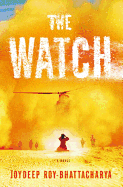
Based on Sophocles' Antigone, The Watch is the story of a fierce firefight at a remote military base in Kandahar Province in Afghanistan. When the sandstorm clears, the attacking Afghans have all been killed, along with two well-liked American soldiers. Before the survivors can recover, a bedraggled figure appears just outside the base's no-cross line. She is Nizam, who has pulled her handcart down the mountain on her war-maimed feet with a shovel and shroud to properly bury her brother, a leader of the attack. From this simple scene, Joydeep Roy-Bhattacharya (The Gabriel Club) brings each of the key characters to complex life. Their voices, from the stilted British-taught English of the interpreter to the first sergeant's Louisiana swamp-talk, draw their individual histories, paranoia and prejudices out onto the novel's stage. Some American soldiers enlist for lack of options at home, some out of obligation, some out of idealism, some out of vengeance. Likewise, some Afghans reluctantly support the U.S. presence out of hatred for past Taliban atrocities, some for the money, some out of tribal strife. Among them, patient Nizam seems to be there only to bury her brother.
The power of Roy-Bhattacharya's novel is his understanding of all the motivations driving his players. None of their reasons is unreasonable... except as perceived by the other side. Is Nizam a decoy for an explosive ambush? Is the interpreter selfishly controlling the negotiations? Is the American captain holding the dead brother's body for propaganda purposes? And is this whole scenario run by absent American generals, Taliban elders and corrupt Afghan politicians? Perhaps the answer to all is yes. --Bruce Jacobs, founding partner, Watermark Books & Cafe, Wichita, Kan.

